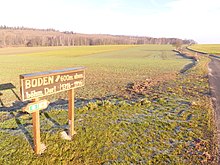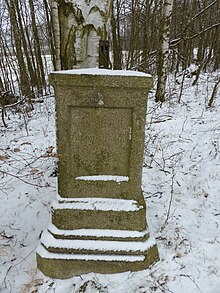Soil (desert)
Boden (Czech provided Rovinka ) is a desert in the municipality of Lipová (German Lindenhau ) in Okres Cheb in the Czech Republic .
Geography and location
Boden lies directly on the German-Czech border between Neualbenreuth and Mýtina ( Altalbenreuth ) on the upper reaches of the Bodenbach (see Muglbach ). Today the border crossing, where there used to be a customs house , is a hiking trail. There a ravine leads to Eisenbühl , which is directly adjacent to the desert. The former village of Boden existed until 1946 and can be recognized today in a grove through ruins of foundation walls.
history
Boden was first mentioned in a document in 1316. It was part of the Frais and belonged to the Hardeck rule . The volcanic soil is considered to be particularly productive and is compared to black earth . Special features in the place were the customs station and a wine tavern , comparable with the privilege of the shower bar in other places. A map from 1812 shows nine four-sided courtyards - including Egerland half-timbered houses - and the customs station. In the years 1821–1823, Goethe , accompanied by the Cheb councilor Joseph Sebastian Grüner, visited Boden and Eisenbühl several times. On the occasion of these stays he wrote the essays Ancient, newly discovered natural fires and traces of embers and volcanic products in the villages of Boden and Altalbenreuth in Fraischlande .
From 1850 Boden was a district of Altalbenreuth in the judicial district of Eger . In 1862 the Frais' special status was dissolved and Boden became part of the Kingdom of Bohemia . At the same time it was repared from Neualbenreuth to Altenalbenreuth. School attendance also took place in Altalbenreuth. In 1900 Boden had 62 inhabitants; on both sides of the Bodenbach with three ponds there were nine farms. The farmer and shoemaker Nattmüller opened a wine bar in 1910. In the 1921 census, 74 people lived in the ten houses in the village, including 55 Germans and five Czechs. After the Germans were expelled from Czechoslovakia , Boden remained uninhabited from 1946. The planned change of name to Rovinka in 1948 was no longer officially announced because the village was about to be demolished in the course of border security and the construction of the Iron Curtain . In 1953 the abandoned village was razed to the ground.
literature
- Jaromír Boháč and Roman Salamanczuk: Zmizelé Chebsko - The disappeared Egerland. Cheb 2007, ISBN 978-80-85018-59-2 . (Czech German)
Web links
- http://www.zanikleobce.cz/index.php?lang=d&obec=2611
- Vybraná zaniklá sídla Dyleňska: Rovinka / Boden
- Films from the Egerland Culture House : 1 , 2 , 3 , 4
Individual evidence
- ↑ Johannes Urzidil : Goethe in Böhmen. Artemis Verlags-AG Zurich, 1962, pp. 170, 363, 420, 431 and 437
- ↑ Chytilův místopis ČSR, 2nd updated edition, 1929, p. 59 Bocanovice - Bodovice
Coordinates: 50 ° 0 ' N , 12 ° 27' E

